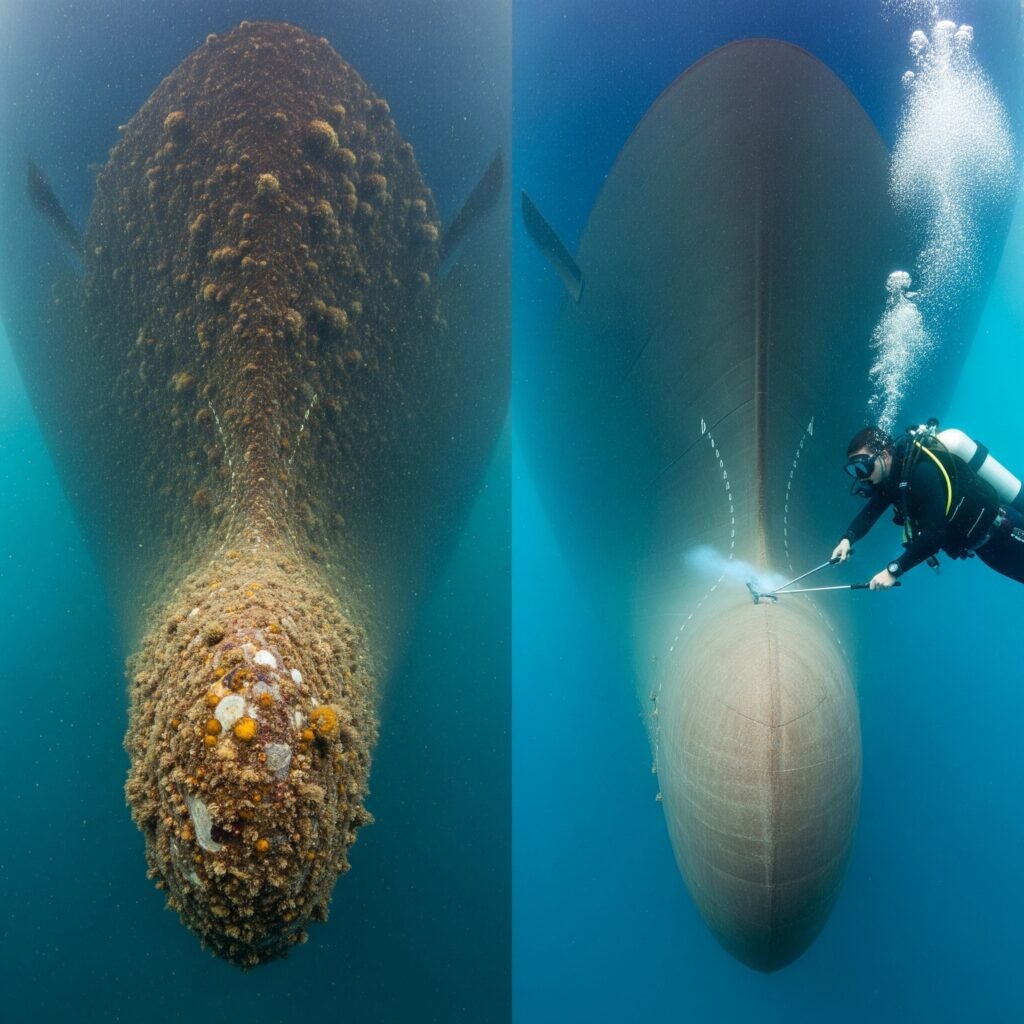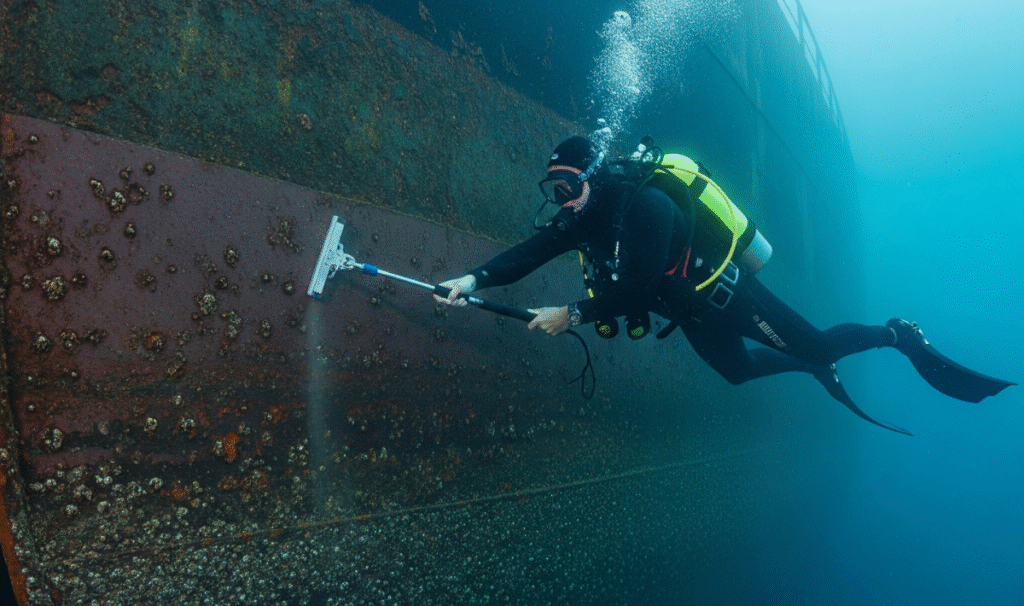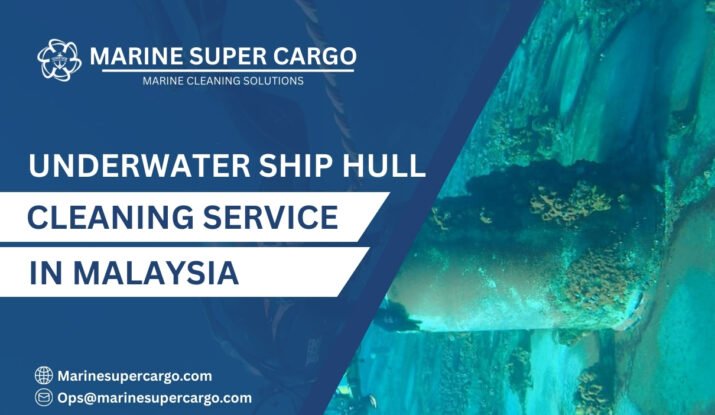Imagine your ship cutting through Malaysia’s tropical waters with the grace of a sea eagle in flight. Yet beneath the surface, the relentless creep of barnacles, algae, and slime threatens to throw a wrench in your ship’s speed and efficiency. This is where underwater ship hull cleaning in Malaysia comes into play: a cost-effective, expert solution that keeps your vessel swift, green, and ready for any voyage. tdxa-
Malaysia’s strategic location along vital maritime routes means that vessels of all sizes dock in ports like Port Klang, Johor, and Tanjung Pelepas. But the tropical warmth that makes these waters so inviting also accelerates biofouling growth, creating considerable drag on vessels. Without regular and professional underwater ship hull cleaning in Malaysia, ships risk losing precious fuel efficiency, facing costly repairs, and encountering regulatory troubles that could slow your entire operation.
What You Need to Know About Biofouling in Malaysian Waters
Understanding Biofouling and Its Effects
Biofouling starts innocently, with microscopic larvae attaching themselves to hulls. Soon, vibrant colonies of barnacles, algae, and mussels form, creating a tough barrier. This layer acts much like a sticky anchor, reducing a ship’s speed, increasing fuel consumption, and straining engines—turning your sleek vessel into a lumbering behemoth.
Why Biofouling Is Particularly Challenging in Tropical Malaysia
The warm, nutrient-rich waters off Malaysia mean that biofouling develops far faster than in cooler climates. Heavy shipping traffic and long harbor wait times further exacerbate the problem. Because of this, underwater ship hull cleaning in Malaysia has become an indispensable service to maintaining efficiency across fleets.

Why Choosing Affordable Yet Quality Underwater Ship Hull Cleaning in Malaysia Matters
Balancing Cost with Professionalism and Compliance
While affordability is crucial, opting for subpar cleaning services can cost you more in the long run. The leading affordable providers offer not just competitive prices but also rigorous safety standards, quality tools, and full compliance with international maritime laws.
The Hidden Risks of Cheap and Unqualified Services
Cheap cleaning may damage hull coatings, expose steel to corrosion, and fail to properly contain harmful biofouling waste. This can lead to fines, unscheduled repairs, and even environmental damage, especially in environmentally sensitive Malaysian waters.
Malaysia’s Coastal and Port Environment: The Setting for Hull Cleaning
Key Ports Safely Served With Hull Cleaning
Malaysia’s major ports like Port Klang, Johor Port, and Tanjung Pelepas are hubs for international trade and shipping. These ports regularly support affordable underwater ship hull cleaning in Malaysia, tailored to the unique demands of tropical marine environments.
Marine Conditions Influencing Cleaning Schedules and Methods
High salinity, warm temperatures, and busy shipping lanes mean increased biofouling rates. Seasonal weather patterns like monsoons can affect visibility and diving conditions, necessitating skilled cleaning teams that can adapt quickly.
Common Methods of Underwater Ship Hull Cleaning in Malaysia
Diver-Based Cleaning Techniques
Experienced divers equipped with advanced brushes and vacuums carefully scrape away marine growth while protecting hull coatings. This manual method remains popular due to its adaptability and precision.
Innovative Robotic and Automated Methods
Cutting-edge robots and remotely operated vehicles (ROVs) help reduce diver risk and speed up cleaning. Robotic systems equipped with cameras also record the hull condition, providing data for maintenance scheduling and compliance.
Environmental and Regulatory Best Practices: MARPOL and IMO Compliance
Ensuring Eco-Friendly Cleaning in Malaysian Waters
Malaysia adheres to international environmental standards like MARPOL and IMO regulations. The top affordable providers implement closed-loop systems that capture and properly dispose of toxic paint flakes, preventing pollution of sensitive marine habitats.
Maintaining Compliance and Avoiding Penalties
Regulatory authorities monitor hull cleaning activities closely. Compliance minimizes the risk of fines, port detentions, or reputational damage—key concerns for shipowners operating in Malaysian waters.
Underwater Ship Hull Cleaning Provider Highlights
What Sets The Leading Affordable Provider Apart
Top providers blend affordability with quality by employing IMCA-certified divers, using the latest technology, and ensuring full waste capture and disposal according to international standards—all without compromising on safety or efficiency.
Benefits of Consistent and Professional Cleaning Services
Ships maintained by the top affordable service enjoy higher speeds, reduced fuel consumption, longer coating life, and fewer breakdowns, fostering reliable operations and regulatory harmony.
How to Choose the Best Affordable Hull Cleaning Provider in Malaysia
Certifications, Technology, and Client Feedback
Request certifications like IMCA compliance, review customer testimonials, ask about equipment and safety procedures, and seek transparent pricing that covers all operational costs upfront.

Future Trends in Underwater Ship Hull Cleaning in Malaysia
The future of underwater ship hull cleaning in Malaysia is being transformed by innovation. Advanced anti-fouling coatings are reducing marine growth, while artificial intelligence is enhancing inspection accuracy and predictive maintenance. At the same time, robotic cleaning systems are becoming more efficient, safe, and eco-friendly. Malaysia is steadily adopting these cutting-edge technologies, ensuring vessels remain faster, greener, and more cost-effective. As the maritime sector embraces digitalization and automation, the nation is positioning itself as a leader in sustainable hull cleaning solutions.
Conclusion
In Malaysia’s challenging marine environment, maintaining a clean hull is not just an option—it’s essential. Underwater ship hull cleaning in Malaysia plays a vital role in ensuring smooth, efficient, and compliant shipping operations. A fouled hull increases drag, slows down voyages, and burns more fuel, driving up costs. By partnering with trusted service providers like CleanShip.co, shipowners can keep their vessels operating at peak performance while reducing environmental impact. Cleaner hulls mean faster transits, significant fuel savings, lower emissions, and reliable compliance with global standards—a smart, sustainable investment that benefits both your bottom line and the ocean.
FAQ:
Q1. How often is hull cleaning recommended in Malaysia?
Typically, every 6 to 12 months, depending on ship operation and fouling rates.
Q2. Is robotic underwater hull cleaning available in Malaysia?
Yes, it is becoming increasingly common for efficiency and diver safety.
Q3. How can I verify a cleaning provider’s compliance?
Look for IMCA certification, environmental compliance records, and transparent contracts.
Q4. Does hull cleaning improve fuel efficiency?
Yes, by reducing drag, it can save up to 15% fuel, which significantly cuts costs.
Q5. What are the environmental impacts of poor hull cleaning?
Uncontrolled debris release can damage marine habitats and lead to regulatory fines.


